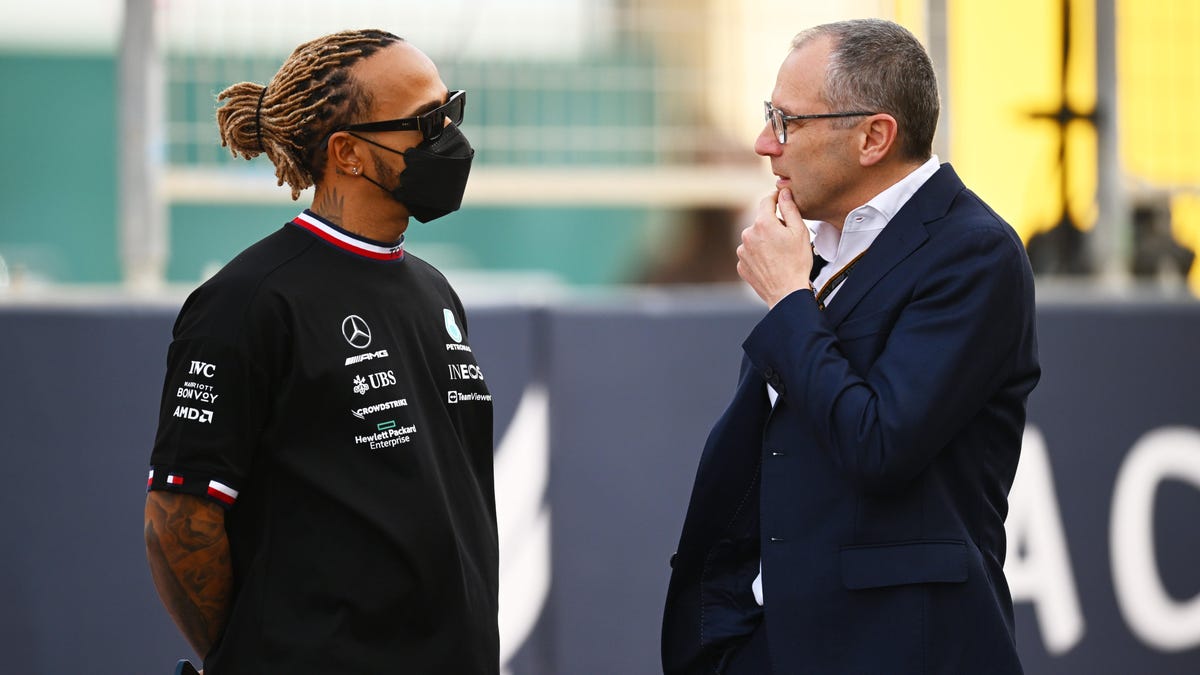F1 Boss: Women Won't Drive in F1 Within 5 Years Without a 'Meteorite'

Lewis Hamilton (left) and Stefano Domenicali (right) at the 2022 Bahrain Grand Prix.Photo: Clive Mason (Getty Images)
Formula 1 CEO Stefano Domenicali has truly popped off during pre-Belgian Grand Prix press conferences, and the subject of one of his recent conversations just so happens to be the place of women in motorsport — specifically the fact that Domenicali doesn’t see any women lining up on the F1 grid any time soon, Sky Sports reports. He’s not totally wrong, but let’s dive into the complexity of what he’s really saying.
“Realistically speaking, unless there is something like a meteorite, I don’t see a girl coming into F1 in the next five years,” Domenicali said. “That is very unlikely.”
He continued:
“We believe that to be able to give the chance for girls to be at the same level with the guys, they need to be at the same age when they start to fight on the track,” he added.
“We are working on that to see what we can do to improve the system. And you will see soon some action.”
And, as further reported in the Washington Post, Domenicali added:
Domenicali said Wednesday that “we are very happy with the collaboration with Formula W. But we believe that to be able to give the chance to girls to be at the same level of competition with the guys, they need to be at the same age when they start to fight on the track at the level of Formula 3 and Formula 2.”
G/O Media may get a commission
ThisWorx Cordless Car Vacuum
Suck it up
Only 2.4 pounds, has a 60w motor for powerful suction, has a lithium battery that can store charge for up to 18 months, which means you can leave it in the car, and it even comes with different heads for different uses as well.
Alright. Now that we have the context, let’s really dig in.
From a place of general sentiment, Domenicali isn’t entirely wrong. Right now, there aren’t many women in the F1 feeder series categories. Tatiana Calderon, who has just been announced to the Charouz Racing Team, is the only woman in Formula 2 — and she has yet to make a start this year because she was competing in IndyCar. There are no women in the FIA Formula 3 Championship, though there are a handful in Regional F3 series — and the entire W Series grid is made of women.
None of these women, though, are set to hit the F1 grid any time soon. In that sense, Domenicali is right: It would take a stunning circumstance to see a woman in F1 within the next five years. Even Jamie Chadwick, who is currently the most capable woman driver on the road to F1, would still likely need to put in some time in international F2 and F3 categories before she could see an F1 seat. But there are about a hundred different ways that Domenicali could have phrased that sentiment without it sounding like he wouldn’t want women in F1 without catastrophic disaster forcing his hand.
Further, Domenicali isn’t wrong when he says that, to really create an equal playing field for women in the sport, there needs to be a greater emphasis on getting young girls into karts.
But there’s one big problem with everything that Domenicali said that pretty much discounts his ability to have an informed opinion on this situation: Formula W.
He is, of course, referring to the W Series, an all-female open-wheel series that competes with Formula 3 spec chassis. Since its outset, the series has had an issue with people wanting to call it “Formula W” instead of the “W Series,” usually referring to a line of reasoning that “it’s the Formula Women series, the one with the girls.”
While this is the kind of slip-up a casual race fan might make, it’s a bad look for the CEO of Formula 1, a sport sees the W Series serve as its support series for eight events a year. If Domenicali is truly invested in encouraging more women to enter racing, it would probably help to correctly identify the all-woman series that already shares a track with F1.
Further — and this is a more personal nitpick — the use of the word “girls” when talking about grown women serves to infantilize adults. When you call a grown woman a girl, you’re telling her that she’s not a professional, that she’s not deserving of the independent respect you’d pay an adult male colleague, and that she doesn’t belong in your world. Because no one under the age of 18 is allowed to compete in F1, no “girl” will ever race in the series. Only a woman would.
So, while Domenicali’s general sentiment here isn’t totally wrong, the very language he’s using to describe his position signifies that he’s probably the last person who should be talking about the legitimate prospects for women in racing.



